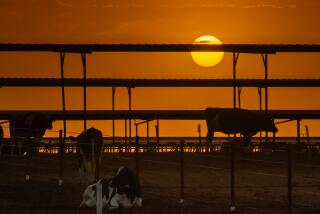Central Valley slaughterhouse closed over inhumane treatment
Federal officials shuttered a Central California slaughterhouse after they concluded that cattle had been subjected to inhumane treatment but said Tuesday they had seen nothing to indicate that the company had compromised the safety of the public’s food supply.
The U.S. Department of Agriculture temporarily closed Hanford-based Central Valley Meat Co. after reviewing video footage from the animal rights group Compassion Over Killing, which said it had captured images of torture and intentional cruelty to cows.
Fallout from the video was swift, with Irvine-based In-N-Out Burger announcing Tuesday it had severed its relationship with Central Valley Meat, one of its suppliers.
“In-N-Out Burger would never condone the inhumane treatment of animals and all of our suppliers must agree to abide by our strict standards for the humane treatment of cattle,” Mark Taylor, In-N-Out’s chief operating officer, said in a statement.
The Department of Agriculture’s Food Safety and Inspection Service said it had seen “disturbing” evidence of inhumane treatment, which it called unacceptable. But the agency said the undercover footage did not show that meat from injured or disabled cows had entered the food supply.
Such a practice, if confirmed, would violate federal food safety regulations and trigger a recall, officials said. The agency’s investigation is ongoing.
“USDA considers inhumane treatment of animals at slaughter facilities to be unacceptable and is conducting a thorough investigation into these allegations,” said Neil Gaffney, spokesman for the Food Safety and Inspection Service. Gaffney said his agency was “prepared to take further action as warranted by the investigation.”
Federal investigators went to California on Friday to review two videos, one running three hours and the other only three minutes. Compassion Over Killing said the footage — which it said was taken by one of its contractors who held a job inside the plant in June and July — captured images of cows being jabbed, hit, electrically shocked and sprayed with hot water.
“Our video evidence clearly demonstrates a lot of suffering these cows are enduring,” said Erica Meier, executive director of Compassion Over Killing. “It’s egregious. It’s unnecessary. We’re trying to shine a spotlight into what’s happening inside the slaughterhouses because this is not an isolated incident.”
Meier’s group said one segment showed a cow who was still alive after being shot in the head being suffocated by workers who stood on its mouth and nostrils. Another featured downed cows, unable to walk, who were shot in the head as many as four times, with workers often walking away as the animal continued to struggle and kick, according to the organization.
Central Valley Meat Co. President Brian Coelho said in a statement that his company was cooperating fully with federal investigators and had retained an outside animal welfare expert to conduct a separate internal investigation.
“We are extremely disturbed to be informed by the United States Department of Agriculture that inspection was suspended and our plant could not operate based on a videotape that was provided to the department by a third-party group that alleged inhumane treatment of animals on our property,” Coelho said.
Central Valley Meat Co. has already been under scrutiny from Cal/OSHA, which has issued three citations to the company in two years — one of them involving 72-year-old Leopoldo Gutierrez, an employee who was crushed to death in a meat grinder. In that incident, state officials concluded that the company had failed to make sure the power was off before the worker climbed inside.
The company filed appeals in two of the three cases, including the one that focused on Gutierrez’s death, according to a Cal/OSHA official.
The latest investigation comes four years after activists with the U.S. Humane Society captured hidden-camera video of cows at a slaughterhouse in Chino being dragged, pushed and hosed. That footage resulted in the plant’s closure and sparked the largest meat recall in U.S. history at the time.
Maureen Ogle, who is working on a history of the meat industry in the United States, said she had not seen the videos and could not comment on specifics. But she expressed surprise at the quick action by federal officials in closing the plant, even temporarily, on the basis of videos from animal activists.
“It seems like an incredible rush to judgment,” she said, noting that in some previous incidents at other meat-processing plants, videos were later found to have been doctored or manipulated.
Federal officials notified Central Valley Meat on Monday that they were withholding the agency’s “mark of inspection,” a move that prevents a plant from producing or shipping its products. Meat-packing companies must have federal inspectors inside their plants who can issue the mark of inspection to its products, officials said.
Times staff writers Tiffany Hsu and Rebecca Trounson contributed to this report.
More to Read
Sign up for Essential California
The most important California stories and recommendations in your inbox every morning.
You may occasionally receive promotional content from the Los Angeles Times.











